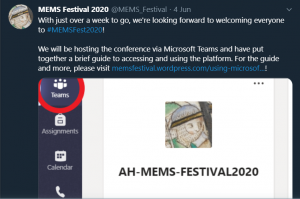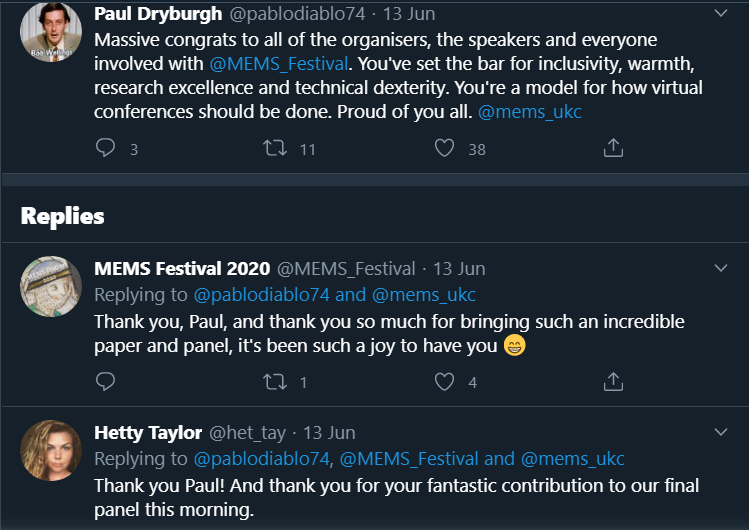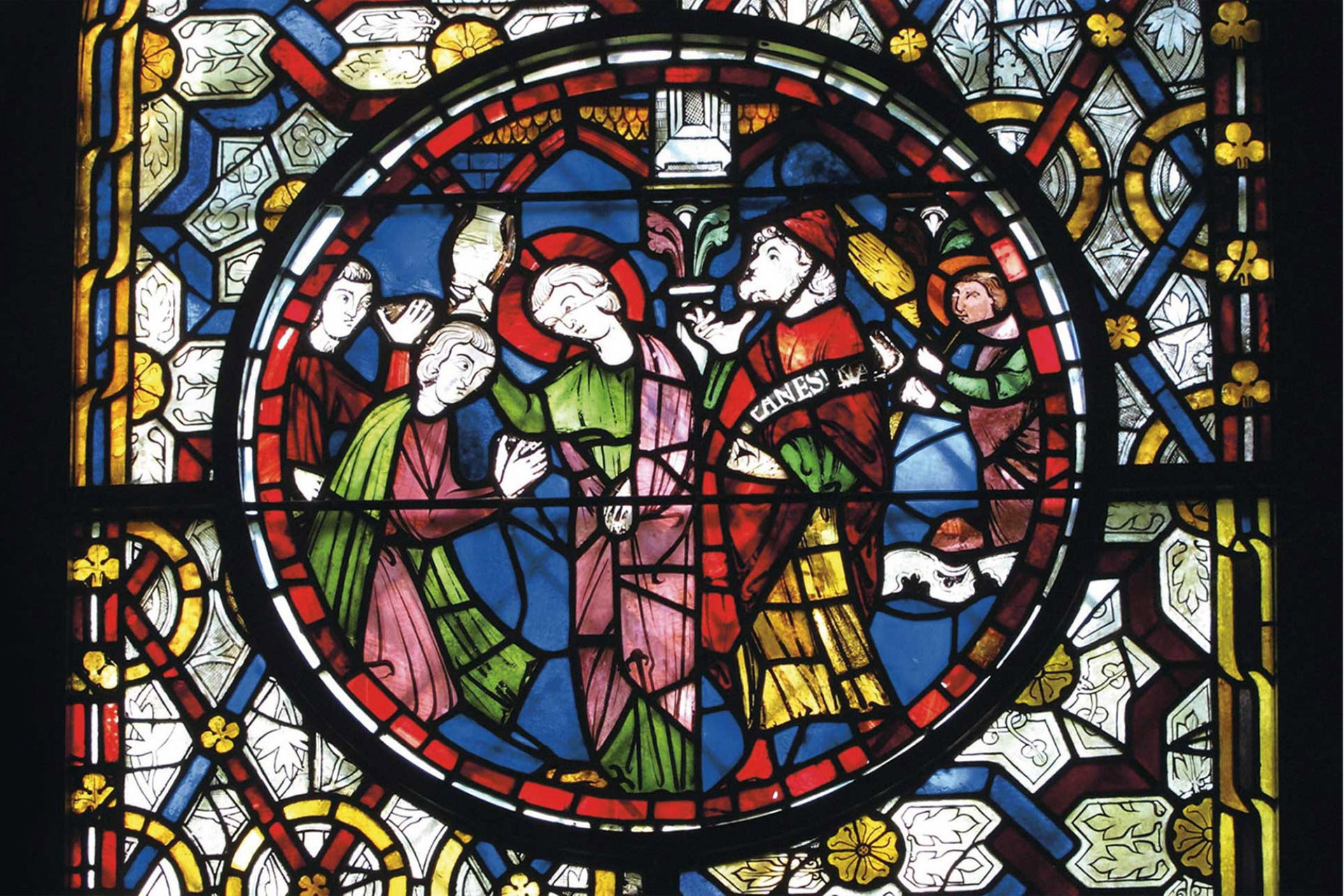Just over a month has passed to process the MEMS Summer festival, the sixth hosted by the centre, and one that proceeded against a decidedly unusual set of circumstances. ‘MEMSFest‘, as it is colloquially known, has always been student- organised. Originally the brainchild of the then MA student Becky Pope, ever since it has been completely run and organised by successive teams of students.
In Autumn 2019, a new team coalesced– Sam McCarthy, Michael Powell-Davies, Hetty Taylor, and Fay Braybrooke – and they began to make formative plans for the next event. As always, former organisers and the admin staff lent their experience – how to gain funding using all possible channels, how to advertise, how to do the dozens of things that make a conference happen, and how to keep the delegates happy when they arrive as our guests in the University of Kent. Little did any of us know.
Of course, exactly as these plans were beginning to take embryonic shape, the cataclysmic reality of a global pandemic swept across all of our lives. As the UK locked down, as the world locked down, and as our inboxes filled with announcements of shelved and cancelled events, it would have been the easiest thing in the world at this point for the organising team to have decided to cancel MEMSFest 2020. Instead, they bravely took a step into the unknown and organised the event electronically. It proved to be a decision that allowed us to see the potential inherent in the online conference format.
Nobody could be sure exactly how successful such an event might be, but it is certainly the case that we had almost double the number of registrants that we had the previous year, with over 190. MEMSFest has, in recent years, attracted delegates from far afield, but the scale of international involvement this year was unprecedented – around a quarter of our auditors this year came from outside of the UK and Ireland, with multiple people from Turkey, Finland, Brazil, U.S., Canada, Australia, Spain, France, New Zealand, Georgia and Germany. We also had many delegates from institutions closer to home, but who would have had to undertake awkward domestic journeys in a conventional conference– for instance from Dublin, St. Andrews, York, Bangor, Newcastle, Durham and Manchester.
It would be naïve to think that we could have attracted such a geographically broad audience in normal circumstances. As it was, as our equally international and far-flung delegates presented in parallel panels, we had unprecedented numbers in attendance, and hosted engaged discussion from people in various forms of lockdown in remote corners of the planet following the panels.
Senior members of the scholarly community from across the academic world were noted as being in attendance at various sessions. Despite not having the same level of personal interaction that we would have had in a material conference, a loss that should be recognised as significant, we nevertheless gained something, in terms of providing a platform for new and exciting postgraduate and early career researchers. The feedback received by the organisation team indicated the positive way in which auditors and delegates responded to the experience:
“This was an uplifting and inspiring event. It show-cased serious, important new research and was enriched by being truly international.”
“Really well done to all – I was very impressed by the online delivery, and barely noticed I wasn’t there!”
“Well done to everyone involved. In adversity and tragedy, we have fast-forwarded to a more inclusive and planet-friendly future for academic exchange, I hope, and the MEMS fest was a model for how it could be done”
Dr Paul Dryburgh, one of our presenters (and an admittedly biased Honorary Fellow of MEMS) provided a very warm appraisal of the MEMSFest experience:
One of our presenters contacted the organising committee after the conclusion of the conference, and provided a very interesting take on what it meant to her to be able to present research as part of an online conference. The delegate revealed that because she was acting as a carer with a severely ill family member, and suffering with her own disability, that quite apart from the Covid-19 pandemic, her academic life was necessarily taking place ‘remotely’. The event allowed her to present a paper that she had previously had to postpone because of caring demands. Going forward, it is perhaps the case that we should consider not only the benefits that online conferences have in terms of engaging an international community, but appreciate how we can support the research profile of those with challenging personal circumstances. As we (hopefully) move beyond strict social distancing, ‘blended’ conferences could also allow access for those for whom presence at academic conferences might be difficult—those with caring responsibilities, parental demands and disabilities, in particular.
In an age too of environmental responsibility, we might also consider the carbon footprint of our dissemination strategies. How much CO2 would have been expended if our delegates had all travelled to Canterbury? Getting together with fellow academics in shared physical spaces will undoubtedly remain hugely important, and especially in facilitating the more relaxed forms of social interaction and off-the-cuff chats that happen at conferences, learning about colleagues and peers as real people over food and drink (and discos!) Nonetheless, this conferencing format will and should have a place in the future of the presentation of academic research. Conferencing might never be the same again.
The organising team would like to also give special thanks to Pietro Mocchi, Róisín Astell, Cassandra Harrington, Anna Hegland, Daniella Gonzalez and Katie Toussaint-Jackson from the MEMS Centre for chairing panels, to Claire Taylor and Jacqueline Basquil for their guidance and help throughout, and to Tim Keward, Tim Jenkins and James Cordery for their assistance in taking the MEMS Festival into the virtual realm. We would also like to thank the Centre for Medieval and Early Modern Studies, the School of History, the School of English at the University of Kent, and the Consortium for the Humanities of the Arts South-East England for their support of this event.
Dr Ryan Perry
Co-Director of the Centre for Medieval and Early Modern Studies,
Senior Lecturer in Medieval Literature, The University of Kent

